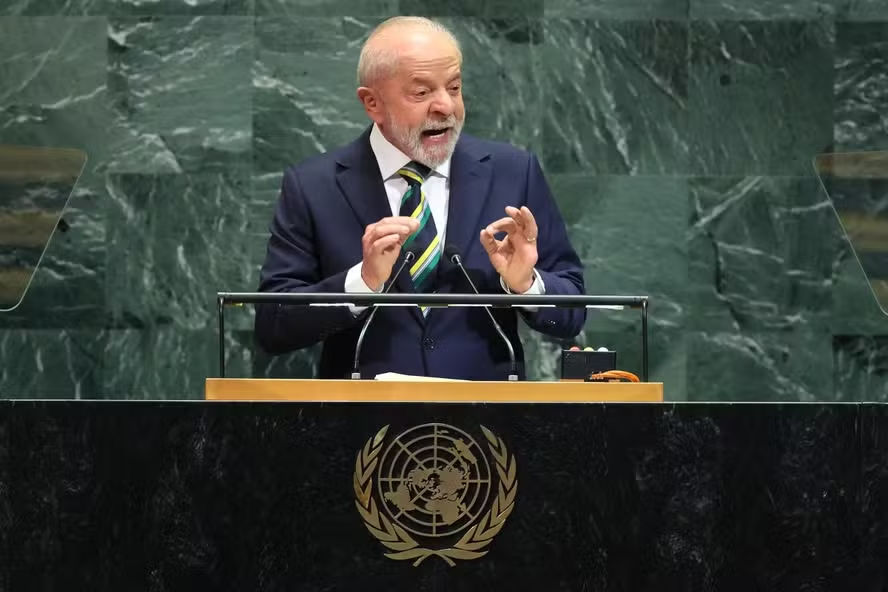Amid rising diplomatic tensions between Brazil and the United States, Presidents Luiz Inácio Lula da Silva (Workers Party – PT) and Donald Trump engaged in a clash of narratives at the UN General Assembly in New York on Tuesday (23). Lula delivered sharp criticism, while Trump took a surprisingly complimentary tone, an approach analysts warn could hide a political trap.
That was the assessment of political scientist Tathiana Chicarino and political communication expert Amauri Chamorro in an interview with Radio BdF. They analyzed the speeches of both leaders at the UN.
As is tradition, Lula opened the session with harsh criticism of “would-be autocrats,” denounced U.S. sanctions against Brazilian Supreme Court justices, defended national sovereignty, and condemned the genocide against Palestinians in Gaza. “Lula’s speech was quite incisive, with very clear positions not only for the domestic audience but especially for the international audience,” Chicarino said, stressing that Brazil positioned itself “as a fundamental actor in a context where Western democracies are being put to the test.”
Trump followed, speaking for about an hour. He attacked the UN, dismissed climate science, threatened military force against alleged Venezuelan gangs and, despite his confrontational tone, surprised many by announcing he would request a meeting with Lula, claiming he had felt “excellent chemistry” during their brief encounter in the assembly’s corridors. For Chamorro, the speech was aimed at a home audience. “His speech was oriented toward the United States, more than to the world.”
Chicarino reminded that the international setting is directly tied to Brazil’s own political moment. In the same speech where Lula spoke about sovereignty and democracy, he also referred to the “false patriots” who attack the country. “The situation has really shifted. We are seeing a decline in the mobilizing power and political articulation of the far right,” she said, pointing to recent street protests against amnesty for coup supporters. Still, she cautioned, “they maintain a presence on social media and a disinformation machine.”
Chamorro highlighted Trump’s communication style as one designed to provoke public reaction. “He is not a leader who builds through dialogue, he is a leader of violence, of brute force,” he said. For Chamorro, Trump relies on the dynamics of the attention economy. “The important thing is that people are watching you and talking about you. And in that, Donald Trump is unbeatable.”
Climate and COP30
On climate issues, Lula stressed the importance of the 30th UN Climate Change Conference (COP30), to be held in Belém, Pará, in November, and called for concrete action against global warming. Chicarino sees his speech as a potential boost for the conference. “This speech might motivate more people and leaders, because he speaks emphatically that we are no longer in the phase of thinking, but of acting,” she said.
In comparing the two addresses, she emphasized that Lula framed sovereignty as defending national interests through multilateral dialogue, while Trump rejected the UN’s role and dismissed international agreements. “Trump is not only a climate denialist but a denialist of science in general,” she stated. For Chicarino, the contrast at the UN was stark. “Lula’s discourse is highly institutionalizing. Trump’s is de-institutionalizing, you can see everything revolves around him alone, nothing in defense of any institution.”
Lula-Trump meeting seen as a trap
Another highlight was Trump’s direct overture to Brazil. By publicly announcing his intention to meet Lula, saying he had felt “excellent chemistry,” the Republican softened his recent aggressive tone following sanctions on Brazil. “This is a historic victory for Brazil in this confrontation. Brazil did not step back, did not give in a single millimeter,” said Chamorro. In his view, “there is no other country in the world without nuclear weapons that has confronted the United States the way President Lula has in recent years.”
Chamorro warned, however, that the possible meeting carries symbolic weight and calculated risks. “It will be a trap to place President Lula in an absolutely uncomfortable position. These constructions, these details, are fundamental for public opinion to interpret that Brazil has not yielded and will not yield, and that President Lula emerged victorious, as is the case right now,” he projected.




